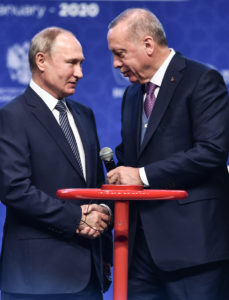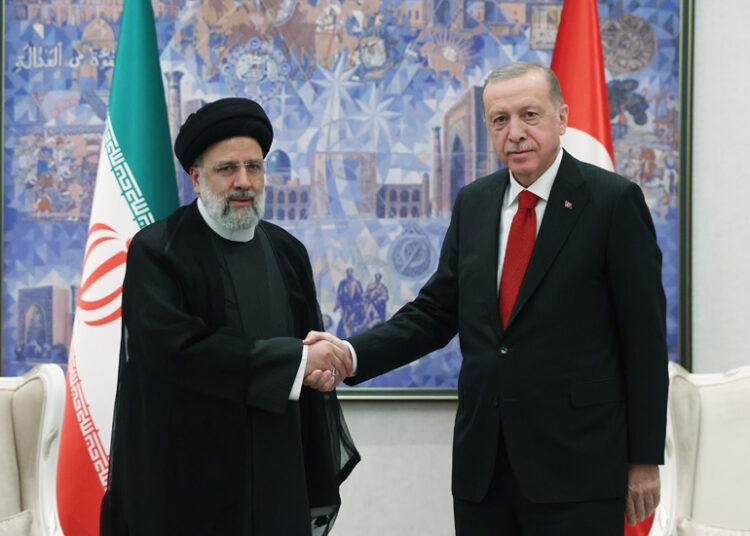Abdullah Bozkurt / Stockholm
According to official statistics, there has been a significant upswing in the establishment of startup companies in Turkey by Russian and Iranian nationals, hinting at a strategic maneuver by Moscow and Tehran since they consider the Turkish market a viable avenue to navigate and mitigate the constraints imposed by Western sanctions.
The burgeoning presence of companies backed by Russian and Iranian interests in Turkey, apparently approved by the government of President Recep Tayyip Erdogan, has the potential to significantly exacerbate Turkey’s already strained relations with its Western allies and partners.
On September 22 the Turkish Union of Chambers and Commodity Exchanges (TOBB), the nation’s largest business group, unveiled its latest data, which showed that Russians have spearheaded the establishment of 592 new companies in Turkey during the period spanning January to August of this year. Predominantly structured as limited companies, these ventures have catapulted Russians to the top of the list of foreign investors creating new enterprises in the Turkish market.
Following Russia’s lead, Iranians have set up 515 new enterprises in Turkey during the same period, with the majority adopting the limited corporation structure. In stark contrast, individuals from Germany — Turkey’s top trading partner and the home of approximately 3 million Turkish expatriates — established a mere 212 companies within the same timeframe.
The declared capital of companies founded by Russians and Iranians stood at TL 646.6 million for Russians and TL 389 million for Iranians. It’s important to note that capital declarations may not always provide an accurate representation of the actual revenue generated by these companies. Often, they reflect minimal figures mandated by regulations to facilitate official registration, enabling these businesses to open bank accounts and engage in formal transactions with government entities.
The majority of foreign-owned companies were classified under the category of “non-specialized wholesale trade,” indicating their establishment for the purpose of engaging in wholesale trade across a diverse range of products.
Data on newly established, foreign-owned companies in Turkey between January and August of this year:
Concurrent with the heightened commercial engagement of Russians and Iranians in Turkey, the US Department of the Treasury has escalated sanctions in the targeting of Turkish companies since last year. The augmented list of Turkish companies and entrepreneurs falling under US sanctions emerged following both public and discreet warnings issued by American officials to their Turkish counterparts and private-sector leaders.
A review of trade registry data pertaining to sanctioned Turkish companies reveals an interesting trend: an increasing number of foreign individuals are adopting Turkish nationality and identifying themselves as Turkish citizens rather than disclosing their countries of origin. Evidently, foreigners have leveraged the Erdogan government’s lenient regulations concerning Turkish citizenship acquisition, often through investments or property purchases in Turkey. Some have gone so far as to change their names to Turkish-sounding ones, possibly as a precautionary measure to evade scrutiny while conducting business with Western firms or during international travel.
As for the trade volume between Turkey and Russia, the most recent data encompassing the period from January to July underscores a significant rise in the overall business activity. Turkey has reported exports amounting to $6.6 billion to Russia, signifying an impressive 83 percent surge when compared to the corresponding period in the previous year, which stood at $3.6 billion. Meanwhile, Turkey’s imports from Russia have witnessed a modest decline, sliding from $32.1 billion to $28.4 billion, marking a 12 percent decrease.

It became obvious that Russia was seeking alternative trade avenues, including Turkey, to maintain its commercial relationships following the imposition of Western sanctions resulting from its invasion of Ukraine in February 2022. Turkey’s imports from Russia experienced a remarkable increase, surging to $58.8 billion in the past year from $28.9 billion in 2021, marking an astonishing year-on-year leap of 104 percent. A commensurate surge in Turkey’s exports to Russia was also observed. In 2022 Turkey exported goods valued at $9.3 billion to Russia, a significant increase from the $5.8 billion recorded the preceding year, constituting a 60 percent rise.
In contrast to Russia, Turkey’s exports to Iran have remained relatively stable over the past five years, hovering consistently between $2 to $3 billion annually. Turkish imports from Iran, however, displayed greater volatility, reaching a peak of $7 billion in 2018 and hitting a low of $1.2 billion in 2020. In the most recent year, these imports rebounded to $3.4 billion.
The modest scale of trade between Turkey and Iran stands in stark contrast to the proliferation of Iranian-owned businesses in Turkey. Many of these companies, established by proxies of the mullah regime in Turkey, employ third countries as intermediaries to export sanctioned and dual-use products, effectively obfuscating their transactions.
As a result the official trade volume may not accurately reflect the scope of bilateral trade between Ankara and Tehran. These shell entities frequently utilize countries such as Iraq, the United Arab Emirates, Azerbaijan and Georgia as intermediate transit points, facilitating the eventual re-exportation of Turkish export goods into Iran.
The extent of the Erdogan government’s commitment and willingness to accommodate Russian and Iranian interests, especially in light of escalating tensions with NATO allies like the United States, remains uncertain. The Western bloc stands as Turkey’s most significant trading partner and a primary source of investment for its financially strained economy.
While President Erdogan and his business associates may envision reaping substantial profits by navigating sanctions under the guise of a “balancing act” by the Turkish government, this policy could ultimately thrust Turkey into turbulent waters, potentially leading to its isolation as a pariah within the international financial system.
In October 2021 Turkey was officially added to the list of countries subject to heightened scrutiny, commonly referred to as the “grey list,” by the Financial Action Task Force (FATF), the international watchdog for money laundering and terrorist financing. Despite some measures undertaken by the Erdogan government to address the FATF’s recommendations, Turkey continues to remain within this classification as of the present day. This “grey list” status has resulted in elevated risk premiums for Turkey, making it more challenging and costly for the country to secure foreign loans.












